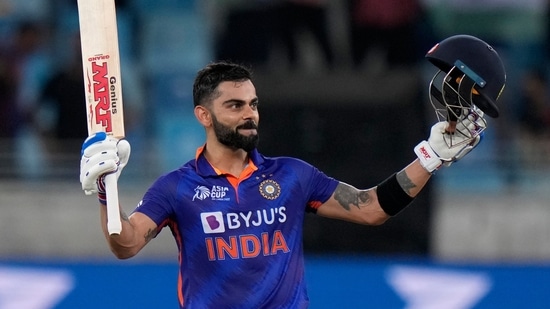Decoding Virat Kohli's 2023 World Cup Century: A Psychological Analysis
Virat Kohli's phenomenal century in the 2023 Cricket World Cup against South Africa stands as a remarkable achievement, not only for him personally but also as a significant moment for Indian cricket. This notable feat was further magnified as Kohli equaled the legendary Sachin Tendulkar's record for the most centuries in one day internationals at that very juncture. Nevertheless, discussions arose regarding whether Kohli's deceleration as he approached his hundred might have influenced the team's collective performance and potentially could have adverse effects on a particular day's outcome. I will be analysing various aspects of that innings using various theories in social psychology. I am a big fan of Virat Kohli but I will be analysing things in a very neutral manner.
 |
| Image credits : Hindustan times |
Self-determination theory
Self-determination theory suggests that people are motivated by three things: autonomy, competence, and relatedness. Kohli may have been motivated by the desire to achieve a personal milestone (autonomy) and to prove himself as one of the best batsmen in the world (competence). However, he may have also been motivated by the desire to win the match for his team (relatedness), and slowing down near his hundred may have been a strategic decision to help the team achieve that goal. For example, he may have felt that he needed to anchor the innings and build a solid foundation for the other batsmen to come in and score quickly. As spectators, it remains challenging to definitively attribute Kohli's innings solely to one motivational factor—autonomy, competence, or relatedness. More likely, his performance was shaped by a dynamic interplay of these motivators, showcasing the complexity of human motivation in the context of competitive sports.
Cognitive dissonance
Cognitive dissonance is a psychological state that occurs when a person holds two conflicting beliefs or attitudes. Kohli may have experienced cognitive dissonance if he felt that his desire to achieve a personal milestone was conflicting with his desire to play freely. This internal conflict is not unique to that point in match; Kohli and Iyer facing while challenging conditions on the pitch, especially when Keshav Maharaj was utilizing the turning conditions to its best, might also have been grappling with conflicting thoughts on whether to adopt an aggressive approach or focus on survival.
![Watch] Keshav Maharaj cleans up Shubman Gill with a magic delivery in IND vs SA 2023 World Cup clash](https://staticg.sportskeeda.com/editor/2023/11/2f6d5-16991783619171-1920.jpg?w=840) |
| Image credits : Sportskeeda |
To reduce this cognitive dissonance, Kohli may have tried to convince himself that slowing down near his hundred and changing the strike frequently was the best way to win the match. He may have also tried to justify his actions to his teammates and the media. It is important to understand that great players are great because they battle such psychological states really well.
Attribution theory
Attribution theory explains how people explain the causes of events. Some people may have attributed Kohli's slowing down to selfishness, while others may have attributed it to other factors, such as pressure, fatigue or strategy. It is important to note that attribution is often biased. People are more likely to attribute negative outcomes to internal factors and positive outcomes to external factors. This is known as the self-serving bias.
In the case of Kohli's century, some people may have been more likely to attribute his slowing down to internal factors, such as selfishness, because India did not cross 350 run mark. Others who focused on India's victory in the match may have been more likely to attribute it to external factors, such as pressure or fatigue, because Kohli is a world-class batsman and it is unlikely that he would intentionally slow down.
 |
| Image credits : Mint |
Social norms
Social norms are the unwritten rules of society. In the context of cricket, there is a social norm that batsmen becomes more careful when they are nearing a milestone. Kohli may have felt pressure to conform to this social norm, which may have led him to slow down.
It's crucial to recognize that social norms are not universal; they can vary across cultures and cricketing traditions. In certain cultures, there may be a heightened emphasis on individual achievements like personal milestones, while in others, the primary focus may be on the team's overall performance. Indian cricket, at times, has reflected a culture that places significant importance on individual achievements, contrasting with teams like New Zealand and Australia, where the emphasis tends to be more on collective success.
 |
| Image credits : Hindustan Times |
It is possible that Kohli felt pressure to conform to the social norm of being more careful, even though he knew that it could cost a few runs to his team. This may have led to his cognitive dissonance and his decision to slow down near his hundred.
Conclusion
It is important to note that there is no right or wrong answer to the question of whether Kohli was selfish in slowing down near his hundred. It is a complex issue with multiple factors at play. Ultimately, it is up to each individual to decide whether they believe Kohli's actions were justified. The above analysis considers various psychological factors that may have influenced Kohli's performance but there might be stronger physical or strategic factors as well which we would never know. It is important to understand that cricket players, like everyone else, are influenced by a myriad of factors, including societal expectations, team dynamics, and personal motivations. Recognizing the complexity of the game and understanding that players operate within a web of influences will contribute to a more balanced and informed discussion among fans and cricket pundits.

Really amazing, I am a big cricket fan and I really enjoyed how you presented the psychological factors that come into the picture when big cricket players such as Virat Kohli are playing especially the times when they are closer to their milestones.
ReplyDeleteThis comment has been removed by the author.
ReplyDeleteVishwas Kalani, great analysis of Kohli's 2023 World Cup century! Your use of self-determination theory, cognitive dissonance, attribution theory, and social norms provides a nuanced perspective. The acknowledgment of subjectivity in assessing Kohli's actions adds depth. Well done! 👏🏏
ReplyDeleteWhat a choice of topic! Virat Kohli's determination has been a constant source of learning for me and your analysis of him on a psychological level is just spot-on. A great deal of topics are covered in such a fine way. Loved reading the blog thoroughly. Thanks for writing this down.
ReplyDelete
ReplyDeleteYour analysis of Kohli's 2023 Cricket World Cup century is insightful, considering psychology concepts like self-motivation and conflicting thoughts. The blog also acknowledges the complexity of Kohli's actions, weighing societal expectations and team dynamics. This combination of sports and psychology promotes a friendly conversation among cricket enthusiasts.
This is amazing vishwas! Such an insightful analysis.
ReplyDelete